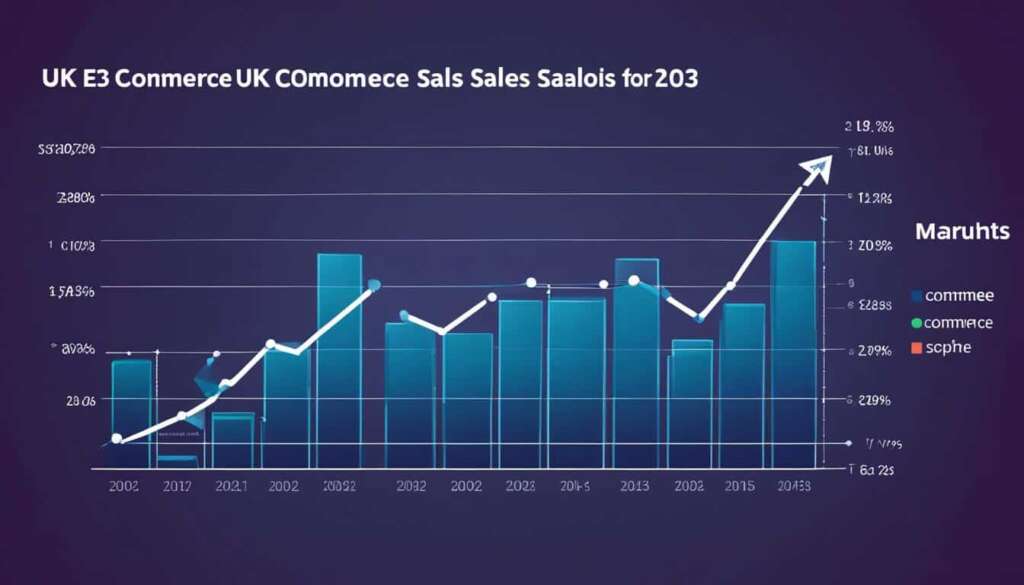Table of Contents
Discover the key to achieving ecommerce success in the UK online retail market. In this article, we will provide valuable ecommerce insights that can help your business thrive in this highly lucrative industry.
The UK is a major player in the global ecommerce market, ranking third in terms of market size. With a projected revenue of $285.60 billion by 2025 and an impressive annual growth rate of 12.6%, the potential for success in the UK online retail sector is immense.
Leading ecommerce product categories in the UK include fashion, electronics, toys, beauty, furniture, media, and food and beverages. Companies such as Amazon.co.uk, Sainsburys.co.uk, and tesco.com have established a strong presence in the market, with Amazon.co.uk being the market leader.
In 2022, online sales in the UK experienced a remarkable 36% increase, marking the highest annual growth since 2007. This surge can be attributed to the changing consumer behavior and the impact of the Covid-19 pandemic, which accelerated the shift towards online shopping.
Stay tuned as we delve into the consumer behavior in the UK ecommerce market, the legal and regulatory environment for ecommerce, the impact of Covid-19 on online retail, and the future growth and trends that can shape the industry.
Consumer Behavior in the UK Ecommerce Market
UK consumers are increasingly turning to online shopping for the best deals and prices. The internet has become the go-to place for fashion, health and beauty, home and garden, consumer electronics, and travel services. A key trend is showrooming, where customers physically visit a store to try a product and then make their purchase online at a better price. Click and collect service is also gaining popularity. Online sales have been thriving while brick-and-mortar stores are facing challenges. UK consumers are mindful of online identity theft and prefer secure websites for financial transactions.
New Shopping Habits
Online shopping has become an integral part of the consumer experience in the UK ecommerce market. With a wide range of products available at their fingertips, consumers are drawn to the convenience and competitive pricing of online retailers. This shift in consumer behavior has led to significant growth in online sales, while traditional brick-and-mortar stores struggle to keep up.
“The internet has revolutionized the way we shop. Consumers can now compare prices, read reviews, and make informed purchasing decisions right from their living rooms.” – Retail Analyst, Jane Smith
Showrooming and Click and Collect
Showrooming has emerged as a popular trend among UK consumers. They visit physical stores to touch, feel, and try products before making their final purchase online, where they often find better prices and deals. This trend highlights the importance of a seamless omnichannel shopping experience, as consumers expect retailers to provide both online and offline options.
Another growing consumer behavior is the adoption of click and collect services. Consumers appreciate the convenience of ordering online and picking up their purchases at a nearby store or designated collection point. This hybrid model allows them to save on shipping costs and receive their items quickly.
Security and Trust
As online shopping continues to flourish, UK consumers are becoming increasingly cautious about their online security. They prioritize secure websites that protect their personal and financial information. Ecommerce retailers must proactively invest in robust security measures to build trust with their customers and ensure a safe shopping experience.
- Choosing secure payment gateways
- Implementing SSL encryption
- Providing transparency in data collection and handling
- Offering secure login and authentication procedures
Legal and Regulatory Environment for Ecommerce in the UK
Operating an ecommerce business in the UK requires a thorough understanding of the legal and regulatory framework. Several statutory instruments have been put in place to govern online business conduct, ensuring consumer protection, data privacy, and fair competition. Familiarity with these laws and regulations is essential for ecommerce success in the UK.
Ecommerce Laws and Consumer Rights
The UK has implemented several key laws that specifically address ecommerce and consumer rights. The Consumer Rights Act 2015 provides a comprehensive legal framework governing consumer protection, including the rights of online shoppers. It establishes the right to a refund, replacement, or repair of faulty goods, as well as clear information about products and services.
Additionally, the Consumer Contracts Regulations 2013 sets out the rules for distance selling, including the obligations of online retailers to provide transparent pricing, product descriptions, and cancellation rights to consumers. This regulation aims to ensure fair and transparent transactions in the online marketplace.
The Consumer Protection from Unfair Trading Regulations 2008 prohibits misleading and aggressive commercial practices, ensuring that consumers are not deceived or coerced into making purchases online. This regulation is crucial in promoting fair competition and protecting consumers from fraudulent or unethical business practices.
Data Protection and Marketing Regulations
Data privacy is another critical aspect of ecommerce regulations in the UK. The UK General Data Protection Regulation (UK GDPR) ensures that online businesses handle personal data securely and responsibly. Ecommerce platforms and websites must implement appropriate data protection measures and obtain valid consent from individuals for collecting and processing their personal information.
In addition, the Privacy and Electronic Communications Regulations 2003 govern direct marketing activities, including email marketing and the use of cookies. This regulation protects consumers from unwanted marketing communications and regulates the use of personal data for marketing purposes, ensuring that individuals have control over their personal information.
Regulation of Online Platforms and Search Engines
Online platforms and search engines play a significant role in the ecommerce landscape, and their operations are regulated by the Online Intermediation Services for Business Users Regulations 2020. This regulation aims to promote fairness and transparency in the relationships between online platforms and business users, preventing unfair contractual practices and promoting competition in the digital marketplace.
Intellectual Property Rights Protection
The UK legal system provides robust protection for intellectual property rights, including copyrights, trademarks, and patents. Ecommerce businesses must ensure that their products, branding, and digital content do not infringe upon the intellectual property rights of others. By respecting intellectual property rights, online retailers can safeguard their own innovations and creations and avoid costly legal disputes.
Ecommerce Laws for B2B Contracts
B2B contracts in the ecommerce sector are subject to the E-Commerce Regulations and other relevant laws. These regulations establish the legal framework for business-to-business transactions conducted online, ensuring transparency, fair competition, and the enforceability of contractual agreements. Ecommerce businesses must comply with these regulations when entering into contracts with other businesses.
By adhering to the legal and regulatory framework for ecommerce in the UK, businesses can build trust with consumers, protect their intellectual property, and mitigate legal risks. Understanding the rights and responsibilities outlined by these laws and regulations is crucial for achieving long-term success in the UK ecommerce market.
Impact of Covid-19 on Ecommerce in the UK
The Covid-19 pandemic had a profound impact on ecommerce in the UK, leading to a surge in online shopping. As non-essential retail stores closed their doors to comply with lockdown restrictions, consumers turned to the internet to meet their shopping needs. This sudden shift towards ecommerce transformed the way people shop, accelerating the growth of the online retail industry.
Across Western Europe, online sales experienced significant growth during the pandemic, with the UK being no exception. As consumers sought convenient and safe alternatives to in-store shopping, ecommerce conversion rates in the UK rose to unprecedented levels. The surge in online shopping can be attributed to various factors, including the closure of physical stores, the fear of contracting the virus, and the convenience of doorstep delivery.
Another significant influence on consumer behavior during the pandemic was the rising cost of living. With economic uncertainty and financial constraints, consumers became more conscious of their spending. As a result, they became more selective and reserved in their purchasing decisions. This made it crucial for businesses to ensure that their products were on the consumers’ wish lists and offered value for money.
In addition to cost considerations, sustainable retail gained prominence during the pandemic. Consumers began prioritizing eco-friendly packaging and materials as they became more aware of the environmental impact of their purchases. This shift towards sustainable practices has compelled businesses to adopt more sustainable approaches to meet consumer expectations and contribute to a greener future.

Overall, the Covid-19 pandemic has brought about a seismic change in the ecommerce landscape in the UK. The surge in online shopping, driven by the closure of physical stores, reserved spending habits, and the growing demand for sustainable products, has reshaped consumer behavior and accelerated the growth of the online retail industry.
Ecommerce Growth and Trends in the UK
Ecommerce plays a crucial role in the UK retail landscape, accounting for over one-quarter of all retail sales. As the UK’s most lucrative ecommerce market in Europe, it’s a prime space for businesses to thrive. With a large majority of the population being digital buyers, the potential for growth is immense. By staying ahead of the latest ecommerce trends, businesses can position themselves for success in the competitive online retail landscape.
Mobile Commerce Dominates
The rise of mobile devices has revolutionized the way people shop online. In the UK, mobile commerce has overtaken tablet commerce in terms of online sales. With the increasing use of smartphones and the convenience they offer, it’s important for businesses to optimize their websites and online platforms to ensure a smooth and seamless mobile shopping experience for customers. This includes responsive design, easy navigation, and mobile-friendly payment options.
The Power of Reviews
Customer reviews have become a significant factor in purchasing decisions. UK consumers heavily rely on reviews to gauge the quality and trustworthiness of products and services. Positive reviews can build trust and credibility, while negative reviews can deter potential customers. Businesses should actively encourage customers to leave reviews, monitor feedback, and respond promptly and professionally to address any concerns or issues raised. This can greatly influence consumer perceptions and drive sales.
The Rise of Sustainability
As environmental awareness grows, sustainability has become a key focus for online shoppers. Consumers are increasingly seeking out eco-friendly options and supporting businesses that prioritize sustainability. This trend has led to a rise in sustainable packaging, eco-friendly materials, and ethical sourcing. Businesses should consider integrating sustainable practices into their operations, as it can not only attract environmentally-conscious customers but also align with evolving consumer values.
Popular Product Categories
When it comes to online shopping in the UK, some product categories dominate the ecommerce market. The most popular goods purchased online include clothes, shoes, books, electronics, and food and beverages. These product categories cater to a wide audience and reflect the diverse interests and needs of UK consumers. Businesses operating in these sectors should focus on delivering exceptional customer experiences and creating a strong online presence to capitalize on the demand for these products.
Preferred Payment Methods
Credit and debit cards remain the preferred payment methods for online shoppers in the UK. In a digital-first economy, it’s essential for businesses to provide secure and convenient payment options, ensuring a seamless checkout process for customers. Implementing secure payment gateways, offering multiple payment options, and protecting customer data are critical steps in building trust and confidence in the online shopping experience.
| Key Insights | Ecommerce Trends in the UK |
|---|---|
| Ecommerce Sales as a Percentage of Retail Sales | Over one-quarter, projected to reach nearly one-third by 2024 |
| Most Lucrative Ecommerce Market in Europe | The UK |
| Mobile Commerce Dominance | Overtaken tablet commerce in terms of online sales |
| Impact of Customer Reviews | Crucial role in purchasing decisions |
| Focus on Sustainability | A growing priority for online shoppers |
| Popular Product Categories | Clothes, shoes, books, electronics, food and beverages |
| Preferred Payment Methods | Credit and debit cards |
Conclusion
The UK ecommerce market presents significant opportunities for online retailers. With the sustained growth of ecommerce and the ever-changing consumer behavior landscape, it is imperative for businesses to stay abreast of the latest ecommerce trends. Effective strategies for success include leveraging video marketing, optimizing for mobile devices, and prioritizing customer reviews.
Despite the challenges brought about by the Covid-19 pandemic, the ecommerce sector is expected to maintain its robust growth trajectory. By understanding and adapting to consumer behavior, adhering to relevant regulations, and embracing emerging trends, businesses can drive their online retail success in the UK.
Looking to the future, the ecommerce industry will continue to evolve and reshape the retail landscape. The increased adoption of advanced technologies, such as artificial intelligence and virtual reality, will further enhance the online shopping experience. Additionally, sustainability will continue to play a pivotal role, with consumers demanding eco-friendly packaging and materials.
In conclusion, by staying ahead of the curve and continuously improving their ecommerce strategies, businesses can position themselves for long-term success in the dynamic UK online retail market.
FAQ
What are some key strategies for ecommerce success in the UK?
Video marketing, mobile optimization, and a focus on customer reviews are essential strategies for online retail success in the UK.
How has consumer behavior in the UK ecommerce market changed?
UK consumers are increasingly turning to online shopping for the best deals and prices. Showrooming, where customers visit a store to try a product and then make their purchase online, is a key trend. Click and collect service is also gaining popularity.
What are the legal and regulatory considerations for ecommerce in the UK?
The UK has various statutory instruments governing online business conduct, such as the Consumer Rights Act 2015, the Consumer Contracts Regulations 2013, and the Consumer Protection from Unfair Trading Regulations 2008. The UK GDPR and the Privacy and Electronic Communications Regulations 2003 address personal data protection and direct marketing. Online platforms and search engines are regulated by the Online Intermediation Services for Business Users Regulations 2020. The UK legal system provides robust intellectual property rights protection.
What has been the impact of Covid-19 on ecommerce in the UK?
The Covid-19 pandemic has accelerated the shift towards online shopping in the UK. With the closure of non-essential retail stores, online shopping became the new normal for consumers. Online sales witnessed significant growth, and the UK saw a rise in ecommerce conversion rates.
What is the current ecommerce growth and trends in the UK?
Ecommerce accounted for over one-quarter of all retail sales in the UK and is projected to reach nearly one-third by 2024. Mobile commerce has overtaken tablet commerce in terms of online sales. Reviews play a crucial role in purchasing decisions, and sustainability is a growing focus for online shoppers. The most popular goods purchased online include clothes, shoes, books, electronics, and food and beverages. Credit and debit cards are the preferred payment methods.
What can businesses do to drive their online retail success in the UK?
By understanding consumer behavior, following regulations, and embracing emerging trends such as video marketing, mobile optimization, and customer reviews, businesses can drive their online retail success in the UK.







